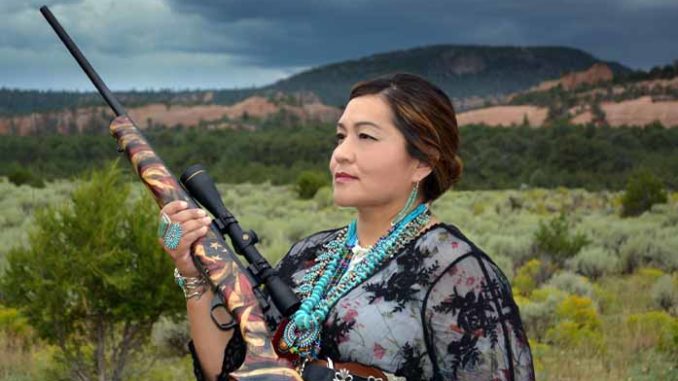
The Navajo Nation was ravaged earlier this year by COVID-19, with more than 140 members dying by mid-May, jumping to 401 by mid-June.
Now as a second wave has hit along with winter weather, attention is being drawn to the plight of those on the reservation who still have limited healthcare options, a lack of readily accessible water, negligible internet access, and an ongoing loss of jobs despite more than $600 million of CARES Act money awarded to the Nation in May.
One of the people shining a light on what isn’t being done to help the Navajo people in desperate need is Karen Bedonie, a businessowner and soft-spoken mother of eight who says she has had enough. And if her comments make people uncomfortable, she says that is okay.
“People are suffering,” Bedonie says in a Dec. 14 video about the impact of COVID-19 among the Nation. “They don’t have enough income to sustain what they were doing before.”
Bedonie is among the 165,000 Navajos living on the 17 million-acre reservation along with another 5,000 or so who are not tribal members. She has utilized YouTube the last few months to post videos depicting the reality of life “on the reservation” which covers parts of Arizona, New Mexico, and Utah.
One of the most frustrating issues, Bedonie says, is that many people she knows are trying to earn income through odd jobs but at the same time they are being ridiculed for not staying home.
“But inside their homes they don’t have enough food in their cupboards, they don’t have enough wood for the winter, they don’t have enough coal, they can’t make their truck payments,” she says. “It’s a nightmare”
Bedonie also notes much of the Nation is still without high-speed internet, making it difficult for most children to engage in many remote educational options. It also limits things like tele-medicine and work-from-home opportunities.
President Donald Trump announced the $600 million in CARES Act funds for the Navajo Nation several months ago, but applications for hardship assistance were not accepted until November. More than $110 million of the funds were spent the last few months bringing electricity to 510 homes, and there have been improvements made to a few dozen homes, such as bathrooms, septic systems, and water cisterns.
Other CARES Act funds are expected to provide updated water loading stations, well improvements, and solar projects in the future. Despite these larger projects, Bedonie says the Nation President and Council must do more to address “the immediate pain of suffering” among Navajo people on the Navajo reservation.
But she doesn’t see that happening soon, so Bedonie has started BIDAhwiil’aah, a nonprofit “forged from the fires of suffering.” BÍDAhwiil’aah, or BIDA for short, will use donated funds to “bring food to the tables, firewood to warm homes, electric for lights, propane for cooking, fuel for necessary travel, clothing for children and so much more,” the group’s website states.
Earlier this year Bedonie, a Republican, ran for Congress, hoping to represent New Mexico’s heavily Democratic 3rd District. One of her reasons for getting into politics was disappointment with the seemingly lack of concern for Native Americans, which comprise about 20 percent of the district.
“We are a forgotten people,” she said in May while campaigning.
Check out www.bidanonprofit.org for more information or go to https://feednavajo.square.site to donate to Bedonie’s Feed Navajo project.
